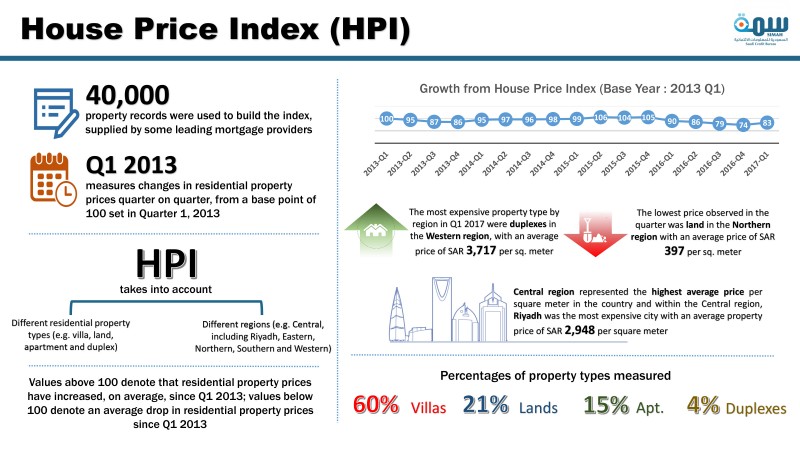SIMAH, the Saudi Credit Bureau, has published its new House Price Index (“HPI”) for the Kingdom of Saudi Arabia. The Index, which was built from a sample of over 40,000 property records supplied by some of the Kingdom’s leading mortgage providers, measures changes in residential property prices quarter on quarter, from a base point of 100 set in Quarter 1, 2013. Values above 100 denote that residential property prices have increased, on average, since Q1 2013; values below 100 denote an average drop in residential property prices since Q1 2013. The Index was built using a technique called Hedonic Regression, the same statistical technique used in other countries, such as the UK, Australia and the US.
By the end of Q1 2017 the overall HPI for Saudi Arabia had risen to 83 from the previous quarter index of 74. This marks the first observed increase in the average value of residential property prices since Q4 2015. The average price of residential property fell steadily in 2016, from an index of 90 in Q1 2016 to a low of 74 in Q4 2016. Despite the increase observed in Q1 2017, the HPI is still tracking below the original base point of 100 set in Q1 2013, denoting an overall fall in average residential property prices since that date.
The HPI also takes into account the difference in prices for different residential property types (e.g. villa, land, apartment and duplex) and different regions, (e.g. Central, including Riyadh, Eastern, Northern, Southern and Western). The most expensive property type in Q1 2017 were duplexes in the Western region, which had an average price of SAR 3,717 per square metre. The lowest price observed in the quarter was land in the Northern region, which had an average price of SAR 397 per square metre. On average, the Central region represented the highest average residential property price per square metre in the country and within the Central region, Riyadh was the most expensive city with an average property price of SAR 2,948 per square metre.
In the HPI, villas comprised 60% of the property types measured, followed by land at 21%, apartments at 15% and duplexes at 4%.
Commenting on the HPI results, SIMAH’s CEO, Nabil Al Mubarak said: “SIMAH is delighted to launch the Saudi House Price Index, which has been developed using a robust sample of high quality residential property data and utilising international best practice statistical methodologies for the development of such indices. We believe that this index, which SIMAH will publish each quarter, will quickly become an important and leading economic indicator for policy makers, banks and mortgage lenders and consumers across the country.
The upwards movement in residential property prices across the Kingdom in Q1 2017 reflects what we have observed in terms of mortgage activity and which is described in the SIMAH Mortgage Credit Index, which we also recently published. The upwards trend in average residential prices, couple with the increase in mortgage enquiries and new loans written, reflects that consumers are starting to actively invest in property once again after a slow and difficult market in 2016. The relaxation of maximum loan to value criteria set by SAMA from 70% to 85% has also had a positive bearing in terms of average residential property values.”
SIMAH’s HPI for Quarter 2, 2017 will be published in August 2017.


